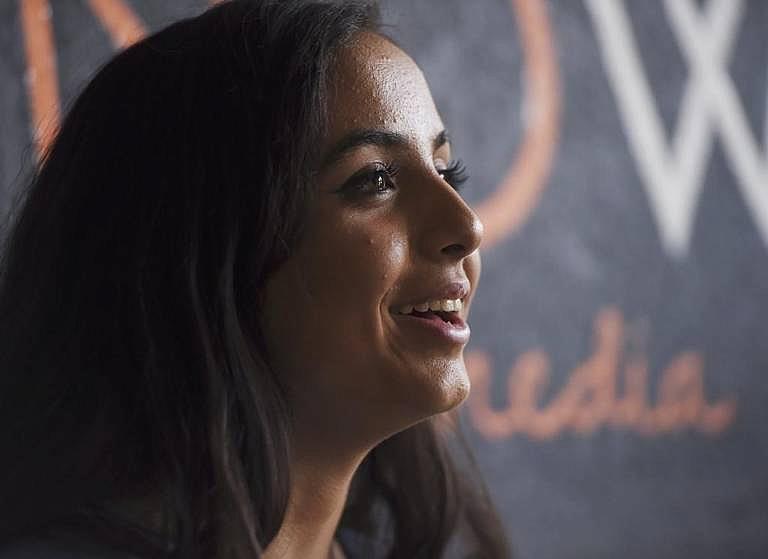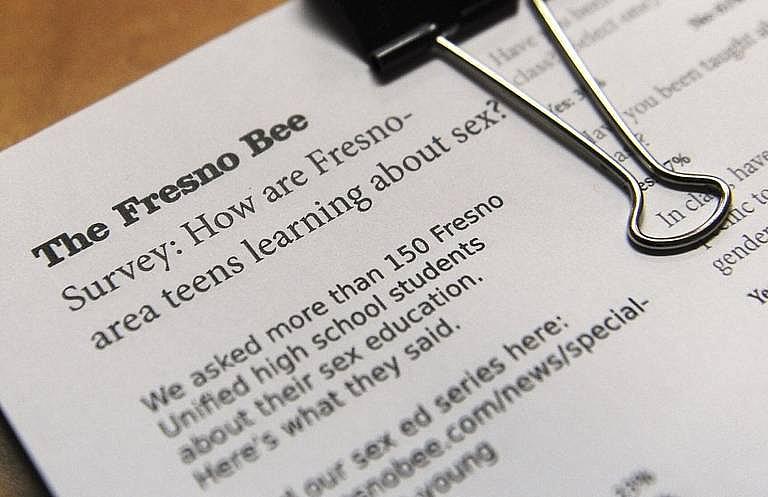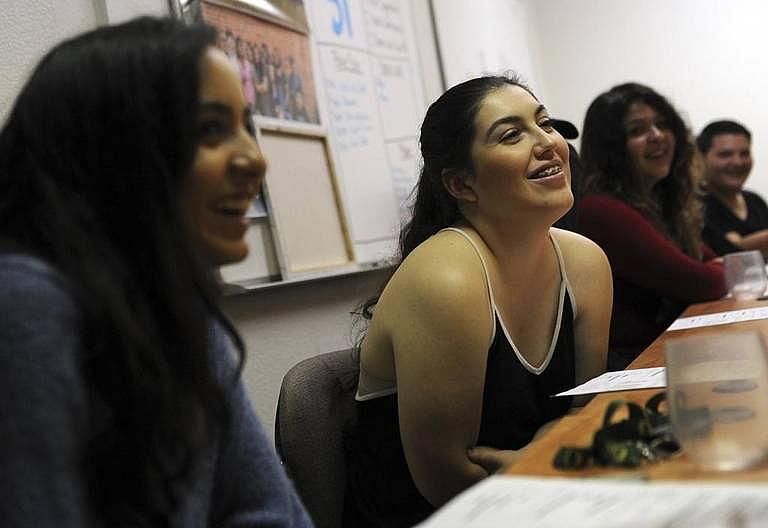Here’s what Fresno high school students say they’re learning about sex
This story is part of a series about sex education and teen pregnancy, and is produced as a project for the USC Center for Health Journalism’s California Fellowship.
Other stories in the series include:
We asked 20 women what they wish they had learned in sex ed class
Teen birth rates are highest in our poorest neighborhoods. But they affect all of us
Sex education is now the law, but conservative school leaders aren’t happy about it
Why are birth rates higher for Latina teens than others? It’s complicated, experts say
This teen mom and her newborn rode a city bus to a school for delinquents. Here’s why
At 14, she was told to hide her baby bump and switch schools. Her shaming wasn’t unique
After reading teen mom’s story, strangers wanted to help. And they delivered.

Maya Vannini, 17, is a student at Edison High School and a member of The Know Youth Media project. She says teachers and parents need to be more open about sexual health in order to curb the area’s high rates of teen pregnancy.
In the face of the state’s highest rates of teen pregnancy and sexually transmitted diseases, some Fresno Unified students say they are not learning much about sexual health in school, or talking about it at home.
Of the nearly 160 Fresno Unified high school students who took an anonymous, voluntary survey conducted by The Bee, more than half said they had only “learned a little” about sex in school. Sixteen percent said they had learned nothing at all.
A state law that went into effect last year mandates medically accurate, unbiased sex education, including lessons on contraception, HIV, sexual consent and more. Health advocates say that’s especially important in the Central Valley, which is home to six of the 10 counties with the state’s highest teen birth rates. Fresno County has the second-highest rate of syphilis in California, and the third-highest rate of chlamydia.
More than 60 percent of Fresno Unified students surveyed said they had not been taught about abstinence in class. Nearly 75 percent said they had not been taught about abortion, and 88 percent said they had not been taught sex education that’s inclusive of LGBT relationships. Those three topics are now required by law; Fresno Unified officials say some of the students surveyed – a majority of whom are 17 years old – missed the new courses that the district now offers as part of the legislation.
73 percent of Fresno Unified students surveyed said they had not learned about abortion in school
The California Healthy Youth Act went into effect Jan. 1, 2016, and the Fresno Unified school board approved a comprehensive sex ed curriculum that aligns with the law in 2015, after going years without teaching comprehensive sexual health. Facing budget cuts, the district ended sexual health classes in 2011.
The Fresno Bee circulated a survey to more than 150 Fresno Unified high school students, asking about their sex education. More than 50 percent of those surveyed said they had only learned a little about sex in school, and 16 percent said they had no sexual health lessons at all.
However, six percent of the students surveyed said they had learned “a lot” about sex in school, and 26 percent said they had learned “a fair amount.”
The conservative Fresno area has a history of push-back against sex ed in schools, infusing the topic with politics and religion.
Fresno Unified Superintendent Bob Nelson said he supports “anything we can do to educate kids to help themselves,” but acknowledged the controversy surrounding sex education in the state’s fourth-largest district. The Fresno Unified school board has gotten national attention after board president Brooke Ashjian spoke out against the LGBT and abortion aspects of the law. Calls by some for Ashjian to resign are ongoing after he urged parents to teach “Judeo-Christian values” when it comes to sex ed.
Nelson said the new curriculum aims to deal with local health crises, and pointed out that families still have the choice to opt their children out of the lessons.
It does me no service to pretend those issues don't exist in our community. — Fresno Unified Superintendent Bob Nelson
“It does me no service to pretend those issues don’t exist in our community … We have to educate on the key things that are affecting us as a community. There’s no shame in that. There’s no hurt in that,” Nelson said. “I equally value a family’s opportunity to say, ‘We don’t want to do that at school, we want to do that at home.’ That’s absolutely their sacrosanct right.”
Maya Vannini, 17, left, and Gabrielle Rivas, 21, members of The Know Youth Media project, discuss sex education at a meeting Wednesday, Oct. 18, 2017 in Fresno.
The Fresno Unified School District reviewed and approved The Bee’s survey before it was given to students at Student Advisory Board meetings and at different youth programs across the city.
More than 70 percent of students surveyed said they do not feel comfortable talking to their teachers about sex, and more than 60 percent said the same about bringing it up to their parents. When asked where they have learned the most about sex, more than 40 percent said from their friends; 35 percent said on TV or online; 13 percent said at school and 8 percent said from their parents.
Maya Vannini, a student at Edison High School, called the Fresno area “the Bible belt of California,” and said sex is treated like “the forbidden fruit” by some parents and teachers, which leads to youth feeling too uncomfortable to ask important questions about sexual health.
88 percent of students have not been taught sex ed inclusive of the LGBT community
“For some families it’s like, ‘It happens, and we don’t talk about it, and that’s final’ … And then we have people who have kids at 14 in Fresno Unified,” she said. “Kids are obviously going to do something that they’re not told to do that heavily. And then they do it wrong – they do it unsafely. They don’t know where they’re supposed to go for help.”
Of the students surveyed, 40 percent said they had had sex. More than 30 percent said they have had unprotected sex.
Sereena Sanchez, a 17-year-old who attends Big Picture High School, said she wishes that schools would talk more freely about something that she sees as a normal part of life.
“We kind of just push it away and don’t talk about it … We just put up that wall, and it’s gone,” she said. “And so it makes talking about it really awkward and uncomfortable for everybody. It’s going to happen. Hormones are going to take over, and we’re going to end up having sex. So, instead of trying to block it, talk about it. Make it more known. So you know what to do and what not to do.”
For some families, it's like, 'It happens, and we don't talk about it, and that's final.’ — Maya Vannini, Edison High School student
Danyeal Escobar, a 17-year-old at Edison High, said that youth want to talk about sex – it’s the adults who don’t.
“It can be awkward, and it can be weird … But I think it’s only like that because we push it down into a corner, and we’re like, ‘We’re not going to talk about this ever, and we’re only going to touch on it maybe for like a week or two in the school year,’” she said. “And that’s why people are like scared of talking about it. That’s why no one wants to get involved with it. I think it’s because we avoid it.”
The Bee set up “listening posts” at local youth programs to hear from teens about their sex education. The posts – comprised of a sign, a recorder and a microphone – asked teens about what they’ve been learning about sex in school, and what they wish they could learn. The posts are modeled after The Listening Post Collective, a media project that aims to engage communities in simple, unique ways.
At one such booth at ACT for Women and Girls in Visalia, a 19-year-old who graduated from Woodlake High School recorded an anonymous statement about her sex education, which she said was based mostly on outdated textbooks. She recalls being taught slogans like “Keep your rocket in your pocket” and “No dingy before the ringy” – which she called “ridiculous” – but said she was never given resources about how to have safe sex.
31 percent of Fresno Unified students surveyed said they have had unprotected sex.
“One day I actually asked my mom if she would be willing to talk to me about sex. I wanted to see how my mom approached the topic,” she said. “To my surprise, she said, ‘Just wait until you’re married and then I’ll tell you. It’s very easy.’ That’s all she told me. I think that’s when I became very aware of how taboo sex is in Latinx households.”
At a listening booth at The Know Youth Media in Fresno, a 17-year-old girl said that her school has briefly taught about puberty and the later stages of sexually transmitted diseases, but hasn’t delved into prevention.
“I find it kind of sad that I feel like I can’t turn to any of the adult allies I have in my life, whether it be my parents, my teachers, uncles, aunts, anyone,” she said. “I can’t turn to anyone about these questions.”
[This story was originally published by The Fresno Bee.]
[Photos by Eric Paul Zamora / The Fresno Bee.]

